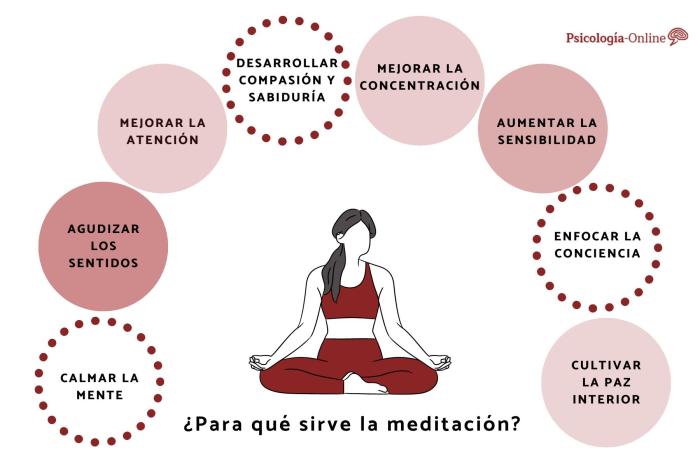6 Tips to Maintain Consistency in Meditation: Embark on a journey to discover practical advice and strategies to help you stay committed to your meditation routine and experience the benefits it brings.
Whether you’re a beginner or seasoned practitioner, these tips will support you in cultivating a consistent and rewarding meditation practice.
Introduction to Meditation Consistency

Consistency in meditation refers to the practice of regularly setting aside time to meditate, without skipping sessions or being erratic in your routine. It is essential for anyone looking to reap the full benefits of meditation.
By maintaining a consistent meditation practice, individuals can experience a wide range of benefits that positively impact their overall well-being and mental health. Consistency allows the mind to settle into a state of calm and focus more easily, leading to improved concentration, reduced stress levels, and enhanced emotional regulation.
Importance of Consistency in Meditation
- Consistency helps establish a routine: By meditating at the same time each day, you create a habit that becomes easier to maintain over time.
- Enhances mindfulness: Regular meditation practice increases awareness of the present moment, leading to greater mindfulness in daily activities.
- Boosts mental clarity: Consistent meditation sharpens the mind, improves cognitive function, and enhances decision-making abilities.
Setting Realistic Goals

Setting realistic goals in meditation is crucial for maintaining consistency and progress in your practice. By establishing achievable objectives, you can stay motivated and focused on your meditation journey. Here are some tips on how to set realistic and measurable meditation goals:
Tip 1: Start Small and Build Up
When setting meditation goals, begin with manageable targets that align with your current level of practice. Gradually increase the duration or intensity of your sessions as you progress.
Tip 2: Be Specific and Measurable
Define your meditation goals clearly and make them measurable. For example, aim to meditate for 10 minutes daily or increase your focus by reducing distractions during practice.
Tip 3: Consider Short-Term and Long-Term Goals
Short-term goals help you stay motivated and track your progress in the immediate future, while long-term goals provide a broader vision for your meditation practice. For instance, a short-term goal could be meditating every day for a week, while a long-term goal may involve reaching a state of deep mindfulness over several months.
Tip 4: Align Goals with Your Intentions
Ensure that your meditation goals reflect your intentions and reasons for practicing. Whether you seek stress relief, inner peace, or spiritual growth, your goals should support these aspirations.
Tip 5: Celebrate Milestones
Acknowledge and celebrate your achievements along the way. Recognizing milestones, such as completing a certain number of consecutive meditation sessions, can boost your confidence and motivation.
Tip 6: Adjust Goals as Needed
Be flexible with your goals and willing to adjust them based on your progress and evolving needs. It’s okay to modify your objectives to better suit your meditation practice.
Establishing a Routine

Establishing a consistent routine is crucial for maintaining a regular meditation practice. Having a set schedule helps in making meditation a habit and ensures that you prioritize this practice in your daily life.
Incorporating Meditation into Daily Routines
Creating a daily schedule that includes specific times for meditation can help you stay consistent. Consider meditating first thing in the morning before starting your day or incorporating it into your bedtime routine. Find a time that works best for you and stick to it.
- Set reminders on your phone or calendar to prompt you to meditate at your chosen time each day.
- Integrate meditation with other daily activities, such as after exercising or before meals, to make it a seamless part of your routine.
- Start with short meditation sessions and gradually increase the duration as you get more comfortable with the practice.
Creating a Dedicated Meditation Space at Home
Having a designated meditation space can enhance your practice and make it easier to meditate regularly. Here are some tips for creating a tranquil meditation space at home:
- Choose a quiet and clutter-free area where you can meditate without distractions.
- Decorate the space with calming elements like candles, cushions, or plants to create a peaceful atmosphere.
- Keep your meditation space clean and organized to promote a sense of serenity and focus during your practice.
Overcoming Challenges

In the journey of maintaining consistency in meditation, there are various challenges that one may encounter. These challenges can hinder progress and make it difficult to stay focused. It is essential to address these obstacles and develop strategies to overcome them effectively.
Identifying Common Obstacles
- External distractions such as noise, interruptions, or environmental factors can disrupt your meditation practice.
- Internal distractions like wandering thoughts, restlessness, or lack of concentration can make it hard to stay focused.
- Resistance to change or feeling unmotivated can lead to inconsistency in your meditation routine.
Tips to Overcome Distractions and Stay Focused
- Find a quiet and peaceful space for meditation to minimize external distractions.
- Practice mindfulness to bring your attention back to the present moment whenever your mind starts to wander.
- Use techniques like deep breathing or visualization to anchor your focus and maintain concentration.
Strategies for Dealing with Resistance and Staying Motivated, 6 Tips to Maintain Consistency in Meditation
- Set small, achievable goals to build momentum and avoid feeling overwhelmed.
- Establish a rewards system for yourself to celebrate milestones and stay motivated throughout your meditation journey.
- Connect with a community or find a meditation buddy for accountability and support in overcoming resistance.
Mindfulness and Awareness: 6 Tips To Maintain Consistency In Meditation
Developing mindfulness and awareness are essential components in maintaining consistency in meditation practice. By cultivating these qualities, individuals can deepen their focus, stay present in the moment, and overcome distractions that may hinder their practice.
Cultivating Mindfulness Throughout the Day
Practicing mindfulness throughout the day can help individuals carry the benefits of meditation into their everyday lives. Here are some techniques to cultivate mindfulness:
- Awareness of Breath: Take moments throughout the day to focus on your breath, observing its rhythm and sensations.
- Body Scan: Conduct a quick body scan to check in with how your body is feeling physically and emotionally.
- Engage Fully: Whether eating, walking, or talking, try to engage fully in each activity without being distracted by thoughts.
- Mindful Listening: Practice active listening during conversations, fully focusing on what the other person is saying without judgment or forming responses in your mind.
Increased Awareness to Support Consistent Meditation Practice
Enhancing awareness can greatly support a consistent meditation practice by allowing individuals to recognize and address obstacles that may arise. Here are some ways increased awareness can benefit meditation:
- Recognizing Distractions: Increased awareness helps individuals identify distractions and gently bring their focus back to the present moment during meditation sessions.
- Emotional Regulation: Being more aware of emotions can help individuals navigate challenging feelings that may arise during meditation, allowing for a more peaceful and focused practice.
- Progress Tracking: Heightened awareness enables individuals to track their progress in meditation, noticing improvements in focus, clarity, and overall well-being over time.
Tracking Progress and Celebrating Milestones

Tracking your progress in meditation practice is crucial for maintaining consistency and staying motivated. It allows you to see how far you’ve come and identify areas for improvement. Celebrating milestones and achievements can also be a great way to acknowledge your dedication and hard work.
Importance of Tracking Progress
- Keep a meditation journal to record your daily practice, including the duration and any observations or experiences.
- Use meditation apps or online tools that offer tracking features to monitor your consistency and progress over time.
- Reflect on how your meditation practice has evolved and the benefits you have experienced along the way.
Methods for Monitoring Consistency and Growth
- Set specific goals for your meditation practice, such as meditating for a certain number of minutes each day or increasing the frequency of your sessions.
- Use a habit tracking app to create a visual representation of your consistency and identify patterns in your meditation routine.
- Consider using a meditation timer with built-in tracking capabilities to monitor your sessions and stay accountable.
Suggestions for Celebrating Milestones and Achievements
- Plan a special meditation session to commemorate reaching a milestone, such as meditating in a new environment or trying a different technique.
- Reward yourself with a small treat or indulgence as a way to acknowledge your progress and celebrate your dedication to meditation.
- Share your achievements with a supportive friend or meditation group to receive encouragement and positive reinforcement.
Conclusion
By incorporating these tips into your daily life, you can create a strong foundation for your meditation practice and enjoy the transformative effects it can have on your well-being. Stay dedicated, stay consistent, and watch as your meditation journey flourishes.